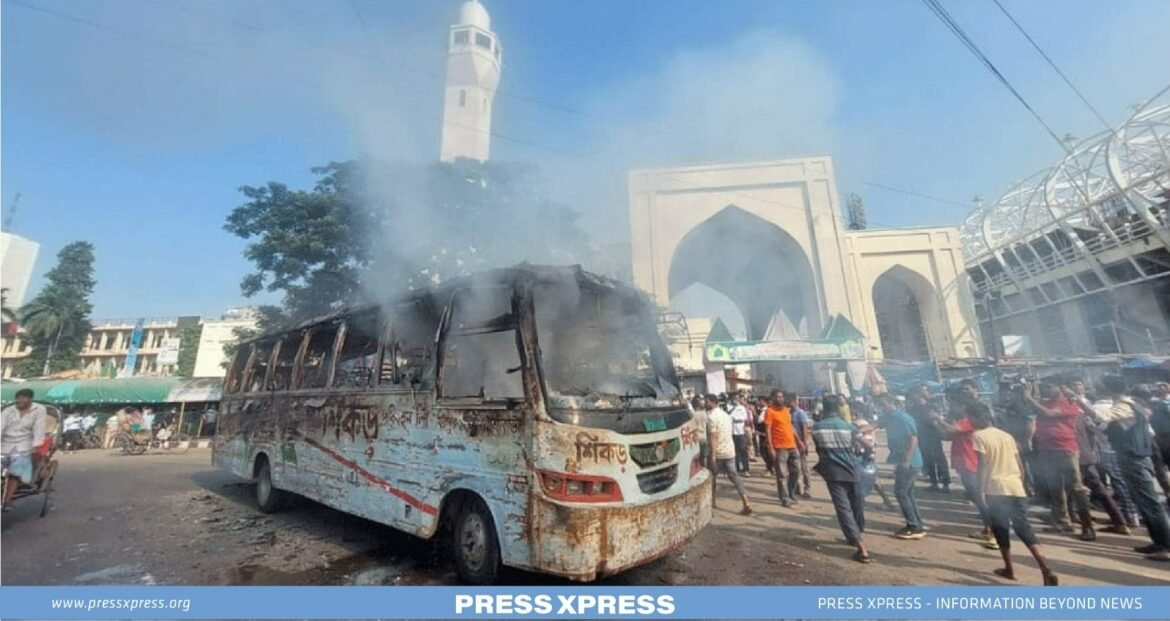Acknowledging the dire need for support, the government’s initiative to provide free treatment for burn patients affected by public transport attacks emerges as a beacon of hope
The BNP and Jamaat led Hartal/Oborodh has seen a string of arson attacks carried out by the two parties. These attacks, aimed at derailing the democratic process and disrupting the 12th National Election of Bangladesh. While their brutal acts of terror have been widely rejected by the population and the government remains undeterred in upholding the democratic process; it cannot be denied that the victims of these attacks have sustained trauma and heartbreak on an unprecedented level.
Victims in Critical Condition
Among the victims, Rabiul, a survivor of these heinous acts, fights for recovery at the Sheikh Hasina National Institute of Burn and Plastic Surgery. Hazrat Ali, his father, shares the heart-wrenching challenges of providing for his three daughters, grappling with the injury of his sole son—a pillar of their family. The echoes of this tragedy reverberate not only in the hospital rooms but also in the homes of those shattered by the flames.
The incident unfolded on October 29, when miscreants set fire to an Asim Paribahan bus in Demra at 3 am, resulting in burn injuries for Rabiul and the tragic death of Naeem. The Sheikh Hasina National Burn and Plastic Surgery Institute has been tirelessly attending to the survivors. Their stories reveal a grim reality of individuals under treatment due to incidents related to BNP-Jamaat-called hartals, blockades, and arson in public transport.
Critical conditions persist for victims like Jabbar, a rickshaw driver with 20% burns, and Sabuj Miah, a bus driver with 28% burns. The hospital paints a somber picture of the struggles faced by individuals like Shaukat, Biprajit, Hasan, and Manik Das, each bearing a unique tale of pain and resilience. The grim reality is that, despite the medical efforts, the road to complete recovery remains uncertain.
Damage done and Human Casualty

The Directorate of Fire Service and Civil Defense reports a distressing tally of 185 vehicles set ablaze, affecting public transport, buses, trains, trucks, and CNG vehicles. Dhaka, experiencing a surge in fires predominantly at night, mourns the loss of three lives to these arson attacks, emphasizing the urgency of addressing this crisis.
In the midst of this turmoil, families like that of bus driver Sabuj Miah face an uphill battle. His wife, Rusheda Begum, articulates the challenges of managing their two children while anxiously awaiting updates on her husband’s prolonged recovery. Sabuj himself recounts the harrowing incident during a BNP-Jamaat-called blockade, shedding light on the sinister tactics employed by the attackers. According to him, a masked middle-aged man threw a bottle that led to the fire that injured him and burnt the bus he was in.
In another hospital bed, Rabiul speaks of his excruciating pain from petrol burns, emphasizing the depth of his wounds by stating that he is in excruciating pain even after the administration of painkillers. The time required for healing will be extensive. Jabbar, a rickshaw puller, bed-ridden with burns on both legs, reveals the financial challenges his family faces, compounded by his wife’s illness since giving birth.
Hassan, a garment worker, vividly recalls the panic and chaos of the bus fire that scarred him, while Manik Das, an aircraft cleaner, bears burn injuries from an attack on a Biman Bangladesh Airlines staff bus. Biprajit, a mechanic, shares his helpless witness to the destruction of his company car in another arson incident.

Dr. Tariqul Islam, a resident doctor, sheds light on the concerning trend of petrol-induced injuries, highlighting their complexity compared to fire-related burns. The importance of multiple surgeries for these victims is underscored, with the risk of incomplete healing looming if necessary, procedures are not undertaken.
Lasting Mental Scars
Amid the physical scars, the mental trauma endured by survivors is deep. Dr. Samanta Lal Sen, the chief coordinator of the institute, emphasizes the prolonged healing period for burns on hands and feet, recognizing the profound impact on survivors’ mental health. Post-treatment mental counseling is deemed crucial, yet the accessibility for day laborers remains a challenge, potentially casting a shadow on their lives.
Acknowledging the dire need for support, the government’s initiative to provide free treatment for burn patients affected by public transport attacks emerges as a beacon of hope. Khandkar Sirajam Munira, a social service officer, assures the continuation of this program, offering a lifeline to those navigating the tumultuous journey of recovery. While the victims may eventually recover thanks to Government assistance, their lives have been permanently scarred due to the greed and ambition of BNP and Jamaat.
BNP and Jamaat Wage War on the People
All these victims share the same tragedy They are not political activists, but everyday people who were just going about their lives. The damage inflicted upon their psyche is tremendous. Their world crashed due to the fact that BNP and Jamaat do not believe in democracy. The upcoming 12th National Election is crucial for the continued progress of the country. The election is the expression of people’s will and the execution of the constitutional mandate. Therefore, by instigating this wanton act of death and destruction, BNP and Jamaat have declared war on the people.


